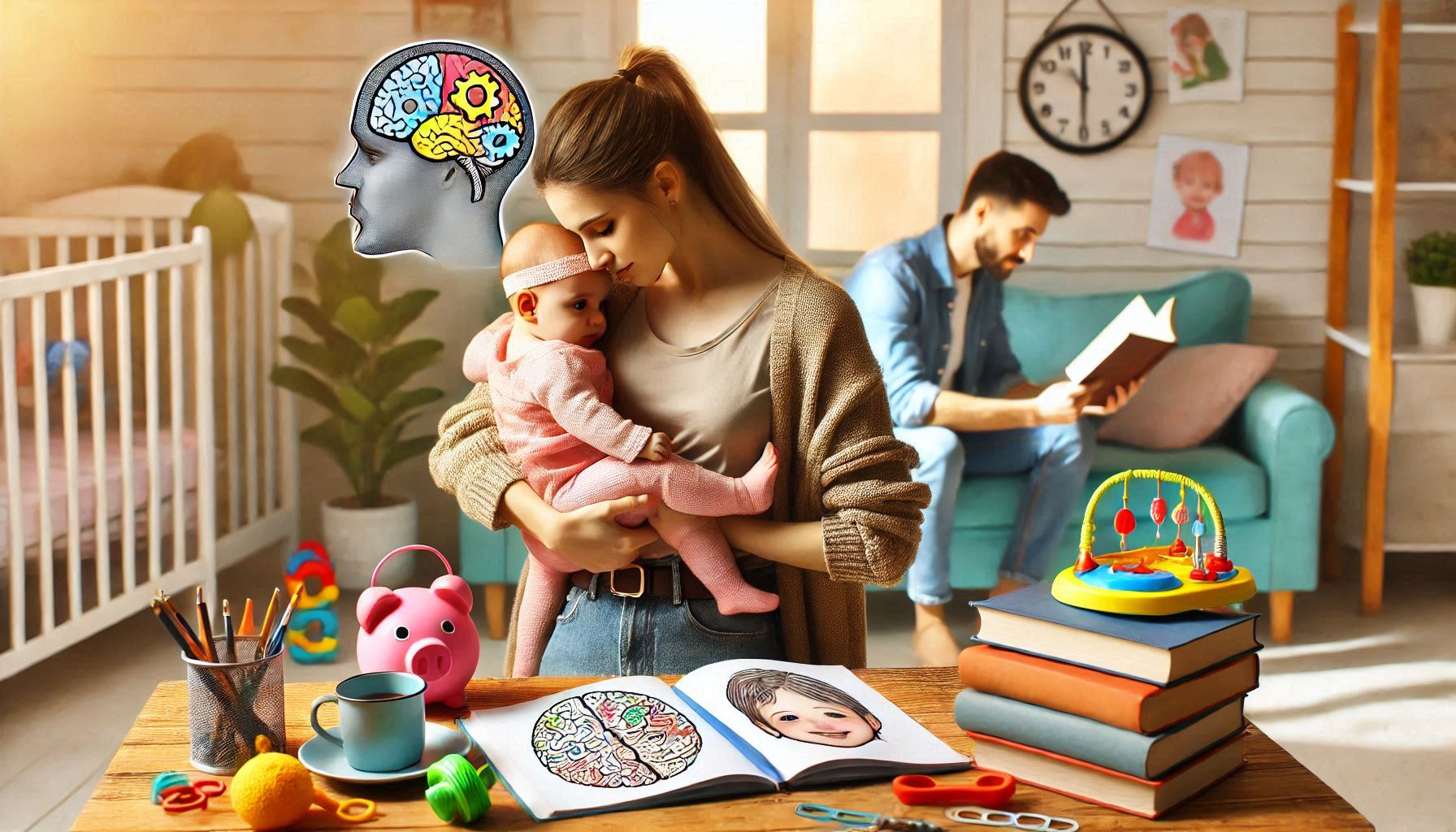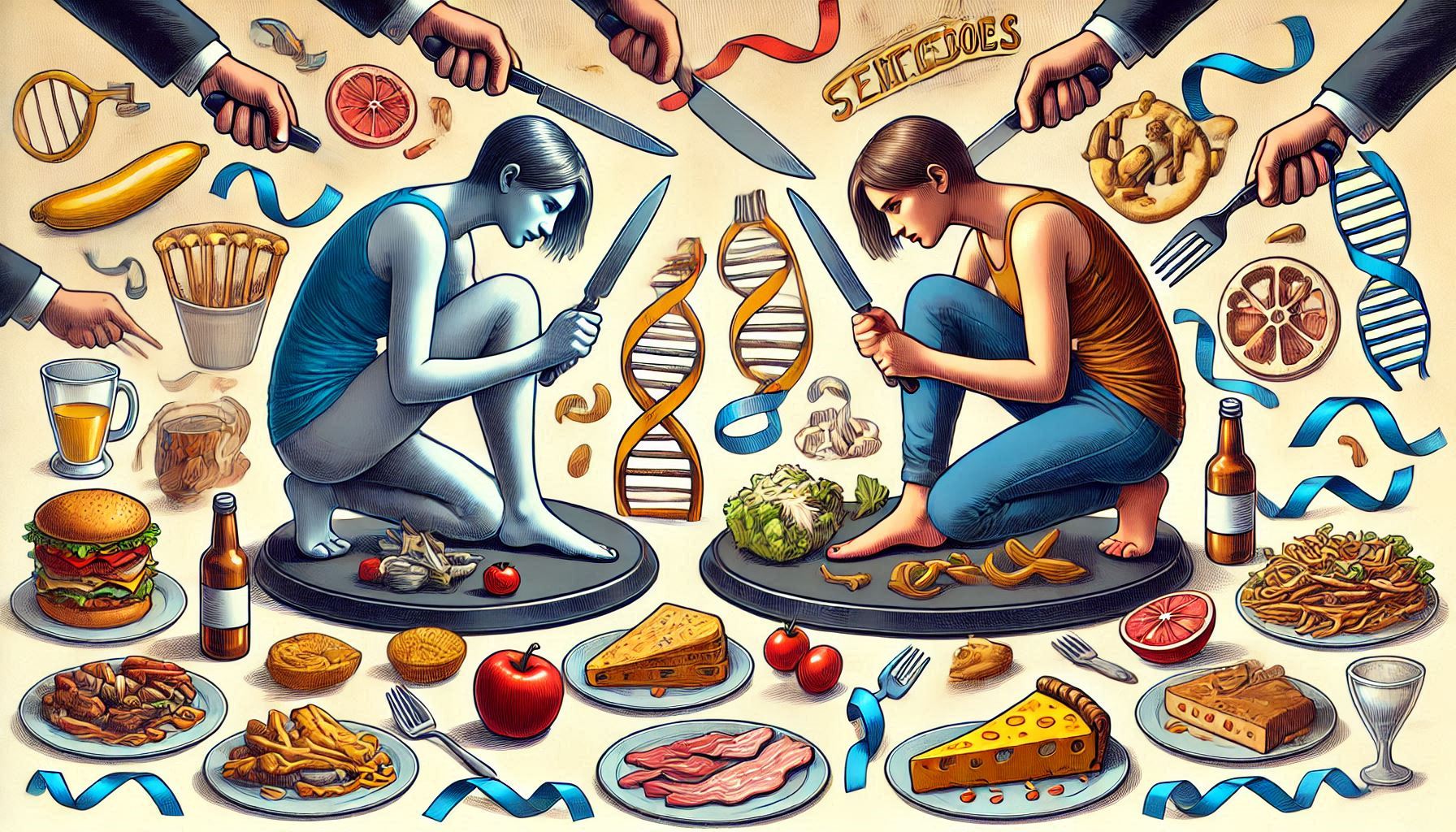Parenting is undoubtedly one of the most complex and demanding roles one can take on in life. From the moment a child is born, parents face a cascade of challenges, both physical and emotional. Yet, while the rewards of raising children can be immense, the emotional burden of parenting is often underestimated. Parents—particularly mothers and fathers—often encounter specific mental health issues during the various stages of child-rearing. These can range from manageable feelings of stress and anxiety to more severe mental health conditions, which can have significant long-term effects on both the parents and their children.
In many societies, the expectation of perfect parenthood remains a daunting pressure, one that may contribute to mental health struggles. The fear of inadequacy, combined with an overwhelming sense of responsibility, can create a breeding ground for anxiety, depression, and burnout. As parents navigate the physical, emotional, and social challenges of raising children, the toll on their mental health becomes ever more evident.
However, it is important to recognize that mental health in parents is not a one-way street; it doesn’t solely affect the parents. It also has a profound impact on the children being raised. Healthy, well-adjusted parents are better able to provide children with the nurturing environment they need for emotional and cognitive development. The reverse is also true—when parents struggle with mental health conditions, the negative effects can often trickle down, creating a cycle of distress that may be passed on through generations.
The purpose of this guide is to explore the unique mental health challenges faced by both mothers and fathers, while also discussing potential diseases that are commonly linked with parenting. Along with recognizing these mental health struggles, this piece will highlight practical cures, therapies, and interventions that can offer relief. By understanding the factors that contribute to mental health issues in parents and addressing them in an informed manner, society can take a major step forward in improving the quality of life for families everywhere.
The Mental Health Challenges of Parenting
The Stress of Parenthood
Parenthood often involves a constant juggling act—balancing work, personal relationships, and the daily needs of the child. The enormity of this responsibility weighs heavily on both mothers and fathers, leading to what is often called “parental stress.” The stress experienced by parents stems from several factors, including sleepless nights, overwhelming responsibility, financial concerns, and the sheer amount of care a child needs, especially in the early years.
For Mothers
The physical and emotional toll on mothers, especially in the postpartum period, is significant. After giving birth, women undergo profound hormonal changes that can lead to feelings of fatigue, mood swings, and general emotional instability. Many mothers feel the pressure to return to their pre-birth physical appearance, be exceptional caregivers, and manage the home, all of which may contribute to mental health challenges.
In addition, many mothers experience what is known as the “second shift.” This term describes the burden of managing household chores and family responsibilities in addition to professional commitments. According to sociologist Arlie Hochschild, mothers often work a full-time job while also coming home to work another “shift” of cooking, cleaning, and taking care of their children. This constant cycle can quickly lead to exhaustion, burnout, and mental health issues like anxiety and depression.
For Fathers
While fathers may not experience the same physical changes as mothers during and after pregnancy, they also face their own mental health challenges. Fathers often take on significant financial responsibilities, especially in families with a single income earner. The stress of ensuring that their children are provided for can exacerbate anxiety and feelings of inadequacy.
Moreover, fathers often feel the pressure to be strong, capable, and in control. This can hinder their willingness to seek help when they feel overwhelmed. Furthermore, many fathers report feelings of being disconnected from their child during the early years, especially when the mother is the primary caregiver. This can lead to feelings of jealousy, guilt, and isolation. The lack of social support for fathers experiencing mental health issues often results in these feelings being left unaddressed.
Impact on Family Dynamics
When parents experience high levels of stress, it can affect not only their emotional well-being but also their ability to interact with each other and their children. High-stress levels can lead to irritability, impatience, and frustration, which can affect communication and bonding within the family. Parents who are consistently stressed may also struggle to model healthy coping mechanisms to their children, making it more difficult for them to learn emotional regulation.
Stress can also impact the parent-child relationship. For instance, a parent who is constantly stressed may be less likely to engage in nurturing, positive interactions with their child. Studies have shown that high-stress levels in parents can lead to an increased likelihood of harsh parenting techniques, such as yelling or physical punishment, which can affect the child’s emotional development.
Postpartum Depression and Other Mood Disorders
Postpartum Depression (PPD) in Mothers
One of the most significant mental health challenges new mothers face is postpartum depression (PPD), a form of depression that occurs after childbirth. Unlike the more temporary “baby blues,” PPD is a persistent condition that can interfere with a mother’s ability to care for herself or her newborn. It affects a significant percentage of new mothers, with estimates ranging from 10% to 20% of all births.
Symptoms and Effects of Postpartum Depression:
The symptoms of PPD often include profound sadness, anxiety, fatigue, irritability, and an overwhelming feeling of inadequacy. In some cases, mothers may have difficulty bonding with their newborn, feeling emotionally detached or indifferent. This can result in feelings of guilt or self-blame, which further exacerbate the depression.
PPD not only affects the mother but also has long-term consequences for the child. Research has shown that infants of mothers with untreated PPD may experience developmental delays, difficulties in emotional regulation, and behavioral issues. Additionally, mothers who are depressed are less likely to engage in positive, nurturing interactions with their child, which is crucial for bonding and emotional development.
Risk Factors for PPD:
Several factors contribute to the risk of developing postpartum depression. These include a history of mental health issues, lack of social support, financial stress, and difficult childbirth experiences. Women who have had previous episodes of depression or who are dealing with major life stressors such as relationship problems or a lack of family support are more likely to develop PPD.
Paternal Postpartum Depression (PPD)
While postpartum depression is often associated with mothers, fathers can also experience a form of depression after the birth of a child. Known as paternal postpartum depression, this condition is becoming increasingly recognized as a legitimate mental health concern. Though it may not be as widely discussed, fathers can experience many of the same symptoms as mothers, including irritability, sadness, sleep disturbances, and difficulty bonding with the baby.
Symptoms and Causes of Paternal Postpartum Depression:
Fathers with postpartum depression may feel overwhelmed by the changes in family dynamics, especially if they are trying to balance work and new caregiving responsibilities. Feelings of helplessness or inadequacy in their new role as a father can lead to depressive symptoms. Additionally, societal expectations of fathers as providers and protectors may make it difficult for them to openly express their emotional struggles.
Risk factors for paternal postpartum depression include a history of mental health issues, lack of support, relationship difficulties, and financial stress. Just like maternal PPD, untreated paternal depression can negatively affect the child and the family as a whole.
Impact on the Family:
When fathers experience postpartum depression, it can have a profound impact on the entire family unit. A father’s depression may contribute to a lack of emotional support for the mother, which can increase her stress and exacerbate her own mental health challenges. Furthermore, fathers who are depressed may be less able to engage with their children in a positive and meaningful way, which can impact the child’s development.
Anxiety and Parenting
Anxiety disorders are another significant mental health issue faced by parents. Anxiety, while often linked with specific worries about a child’s well-being, can also be a generalized issue that affects many aspects of a parent’s life.
Generalized Anxiety Disorder (GAD)
Generalized Anxiety Disorder (GAD) is a common anxiety condition that can develop during the early years of parenting. GAD is characterized by excessive worry about everyday things, including a child’s health, behavior, or future. Parents with GAD may become fixated on the possibility of something bad happening to their child, and this constant state of worry can lead to mental and physical exhaustion.
Parents with GAD may experience difficulty concentrating, sleep disturbances, muscle tension, and irritability. The ongoing worry can interfere with a parent’s ability to fully enjoy their role, leading to disengagement from their child and family life. In severe cases, GAD can lead to panic attacks, which can further isolate parents and limit their ability to function effectively.
Obsessive-Compulsive Disorder (OCD) and Parenting
Obsessive-Compulsive Disorder (OCD) is a mental health condition characterized by obsessive thoughts and compulsive behaviors. In the context of parenting, OCD often manifests in parents’ excessive preoccupation with their child’s safety, cleanliness, or behavior. For instance, parents may develop obsessive rituals, such as excessive hand-washing or checking locks repeatedly, to ensure their child’s environment is safe.
While many parents may experience some level of concern for their child’s safety, OCD takes these concerns to an extreme level. The compulsive behaviors that accompany OCD can significantly interfere with a parent’s ability to provide a healthy and supportive environment for their child. Additionally, parents with OCD may feel anxious about not meeting the standard of perfect parenthood, leading to further distress.
Parental Burnout: The Silent Epidemic
Parental burnout has become an increasingly common issue in today’s society, yet it often goes unnoticed and untreated. This condition is a state of emotional, physical, and mental exhaustion caused by the excessive and prolonged demands of parenting. It typically occurs when parents feel overwhelmed by their responsibilities and perceive themselves as inadequate or ineffective caregivers. While stress is a normal part of parenting, when it becomes chronic, it can lead to parental burnout.
Symptoms of Parental Burnout
The signs of parental burnout can vary, but they often include feelings of emotional detachment, irritability, and a sense of being overwhelmed by parenting duties. The parent may also feel a lack of fulfillment or joy in their role, and experience exhaustion that goes beyond typical tiredness. There can be a marked decline in motivation to engage with the child, as well as feelings of failure as a parent. These parents may struggle with negative thoughts like “I’m not good enough” or “I can’t do this anymore.”
Physical symptoms include chronic fatigue, sleep disturbances, headaches, muscle tension, and even gastrointestinal problems. Over time, parental burnout can lead to more severe mental health conditions, such as depression and anxiety. These physical and emotional symptoms can, in turn, create a toxic cycle, making it difficult for parents to break free and care for their well-being or their child.
Causes of Parental Burnout
Several factors contribute to parental burnout. The first and most obvious factor is the sheer volume of responsibilities that come with raising children. Parents, particularly mothers, often feel pressured to be the perfect caregiver, balancing the needs of their children with professional and personal responsibilities. This constant juggling can lead to exhaustion.
The lack of adequate support is another significant factor. Many parents, especially those without extended family nearby or a strong social network, feel isolated in their parenting journey. Without someone to share the load—whether it be through physical help or emotional support—burnout becomes inevitable.
Moreover, the lack of work-life balance in modern society plays a key role in exacerbating parental burnout. Many parents struggle to manage the demands of their professional lives while simultaneously meeting the needs of their children. The absence of flexible work schedules and affordable childcare services only increases this strain.
Effects of Parental Burnout on Children
Parental burnout does not just affect the parent; it also has a significant impact on children. Parents who are burned out often withdraw emotionally, which can affect their ability to bond with their child. The emotional unavailability of the parent can lead to feelings of neglect or insecurity in the child, affecting their attachment style and emotional development.
Children may also feel the tension and frustration that often accompany parental burnout, leading to behavioral problems such as increased anxiety, aggression, or emotional withdrawal. A parent who is exhausted may not have the energy or patience to deal with challenging behaviors from their child, leading to more stress for both parties.
In the long term, children who are raised by parents who are burned out may be at an increased risk of developing mental health issues themselves, as they often model their coping strategies after their parents. This makes it essential to address parental burnout as early as possible to prevent a generational cycle of mental health challenges.
Diseases Linked to Parental Mental Health
Mental health issues faced by parents are often linked to specific diseases and conditions. These include mood disorders, anxiety disorders, substance abuse, and other health concerns that not only affect the parents but also impact their children and the family as a whole. Let’s explore some of the most common diseases associated with parental mental health struggles.
Depression: The Silent Struggle
Depression is one of the most prevalent mental health conditions affecting both mothers and fathers. While it can develop at any point in life, the demands of parenting can trigger or exacerbate depression. For many parents, the transition to parenthood is a significant life change that disrupts their mental and emotional equilibrium.
Symptoms and Impact of Depression in Parents
Depression in parents can manifest in a variety of ways. Some may experience persistent feelings of sadness, hopelessness, and guilt. Others may feel emotionally numb or detached from their child. Physical symptoms can include fatigue, changes in appetite, sleep disturbances, and difficulty concentrating. Parents may also have negative thoughts about themselves and their ability to parent effectively.
Depression in parents has profound implications for children. Studies have shown that children of depressed parents are more likely to experience developmental delays, emotional difficulties, and behavioral problems. These children may struggle with forming secure attachments, which are crucial for healthy emotional development. Furthermore, the emotional unavailability of the parent can contribute to feelings of neglect and insecurity in the child.
Treatment for Depression
Fortunately, depression is treatable, and there are a variety of interventions that can help parents regain their emotional health. Cognitive-behavioral therapy (CBT) is one of the most effective forms of therapy for treating depression, as it helps individuals reframe negative thought patterns and adopt healthier ways of thinking.
Antidepressant medications may also be used to regulate mood and alleviate symptoms of depression. However, medication should always be prescribed and monitored by a healthcare professional, especially for parents who are breastfeeding or pregnant.
Anxiety Disorders: The Constant Worry
Parenthood is a time when anxiety levels can peak, especially for parents who have a history of anxiety disorders or who are prone to excessive worry. Parents often experience generalized anxiety about their child’s well-being, fearing everything from minor illnesses to more serious concerns about their child’s safety.
For some parents, anxiety can manifest as panic attacks, which are sudden and overwhelming episodes of fear or discomfort. These attacks may be triggered by parenting challenges, such as a difficult situation with the child or feeling overwhelmed by responsibilities. Anxiety disorders can also lead to excessive checking or overprotectiveness, which can interfere with daily functioning and strain relationships.
Treatment for Anxiety Disorders
Cognitive-behavioral therapy (CBT) is also highly effective in treating anxiety disorders. This therapy helps individuals identify and challenge irrational thoughts, replacing them with more realistic and balanced thinking. Mindfulness practices, such as meditation and deep breathing exercises, can also help reduce anxiety symptoms by promoting relaxation and emotional regulation.
In some cases, medication may be necessary to manage anxiety symptoms. Selective serotonin reuptake inhibitors (SSRIs) and other anti-anxiety medications can be prescribed to help alleviate the physical and emotional symptoms of anxiety.
Substance Abuse: Using Coping Mechanisms
Substance abuse can often go hand-in-hand with mental health challenges, as many parents may turn to drugs or alcohol as a way to cope with the stresses of parenting. Substance abuse may serve as a temporary escape from overwhelming emotions, but in the long run, it can exacerbate mental health issues and have detrimental effects on both the parent and the child.
Signs of Substance Abuse in Parents
Parents who struggle with substance abuse may display signs of neglect, irritability, and emotional withdrawal from their children. They may also experience financial difficulties, legal issues, or strained relationships due to their substance use. Moreover, children of parents with substance abuse problems may experience emotional distress, neglect, or even abuse.
Treatment for Substance Abuse
Substance abuse treatment is crucial for breaking the cycle of addiction and mental health issues. Behavioral therapies, including CBT and motivational interviewing, are commonly used to help individuals understand the root causes of their addiction and develop healthier coping mechanisms. Family therapy can also be helpful in addressing the impact of substance abuse on family dynamics and rebuilding relationships.
Cures and Treatments for Parental Mental Health Issues
Addressing mental health issues in parents is crucial not only for their own well-being but also for the well-being of their children and the entire family. Fortunately, there are numerous treatments and strategies available to help parents manage and overcome mental health challenges. These treatments include therapy, medication, lifestyle changes, and support systems.
Therapy and Counseling: A Path to Healing
One of the most effective treatments for mental health issues in parents is therapy. Therapy provides a safe space for parents to talk openly about their feelings, struggles, and experiences. Cognitive-behavioral therapy (CBT) is particularly effective for treating conditions like depression and anxiety, as it helps individuals identify negative thought patterns and replace them with healthier ways of thinking.
Couples therapy is also valuable for parents who are experiencing relationship stress as a result of parenting challenges. Parenting itself can place strain on even the strongest relationships, and working through these challenges with a professional can help partners strengthen their communication, support each other more effectively, and reduce feelings of resentment.
Family therapy can also be beneficial for improving family dynamics and resolving conflicts that may arise due to a parent’s mental health struggles. This type of therapy fosters healthy communication and understanding between family members, allowing them to support one another in more meaningful ways.
Medication: Regulating Mental Health
For parents experiencing severe mental health conditions, medication may be necessary to alleviate symptoms and stabilize mood. Antidepressants, anti-anxiety medications, and mood stabilizers are often prescribed to help manage mental health conditions.
However, medication should always be prescribed by a healthcare provider, and its use should be regularly monitored to ensure it is effective and safe, especially for breastfeeding or pregnant mothers. Medication alone is not a complete solution; it is most effective when combined with therapy and other forms of support.
Support Networks: The Power of Connection
Having a strong support system is essential for parents facing mental health struggles. Support groups, both in-person and online, provide parents with a sense of community and connection. These groups allow parents to share experiences, offer advice, and support one another through difficult times. Peer support can be incredibly validating, helping parents realize that they are not alone in their struggles.
Support can also come from family and friends. Regular check-ins with loved ones, whether through phone calls or in-person visits, can help provide emotional support and alleviate feelings of isolation. Additionally, some parents may benefit from joining community parenting groups or seeking professional help from therapists or counselors.
Self-Care: Prioritizing Mental Health
Self-care is a critical component of maintaining mental well-being for parents. Taking time for oneself, whether through regular exercise, hobbies, relaxation, or simply resting, can help recharge emotional batteries and prevent burnout. Parents must recognize the importance of caring for their own mental health in order to care for their children effectively.
Practicing mindfulness and meditation can also help reduce stress and improve emotional regulation. Learning to prioritize personal time, setting boundaries, and asking for help when needed are all essential components of self-care.
Conclusion
Parenting is one of the most fulfilling yet challenging roles that anyone can undertake. The mental health struggles faced by both mothers and fathers are real and can have a profound impact on both the parents and their children. From postpartum depression and anxiety to burnout and substance abuse, parents must be aware of the mental health challenges they face and seek help when needed.
It is essential for society to recognize the importance of mental health care for parents and provide the necessary resources, support, and education to help them cope. By offering therapy, medication, support networks, and self-care tools, parents can improve their mental health and create a more nurturing, loving environment for their children.
When parents prioritize their mental well-being, they not only improve their own lives but also provide a better future for their children. Healthy, well-adjusted parents create healthy, well-adjusted children—forming the foundation for a better society.
SOURCES
Ainsworth, M. D. S. (1989). Attachment and other emotions: The importance of family caregiving. The Journal of Social Issues, 45(3), 1-11.
Beck, C. T. (2002). Postpartum depression: A review of the literature. Journal of Obstetric, Gynecologic & Neonatal Nursing, 31(1), 1-10.
Belsky, J., & de Haan, M. (2011). Parenting and children’s mental health: A developmental perspective. Current Opinion in Psychology, 2(1), 59-64.
Boden, M. T., & Thompson, A. L. (2017). Parenting stress and mental health disorders in mothers of children with autism: An overview and review of the evidence. Clinical Child and Family Psychology Review, 20(4), 366-383.
Cohen, J. A., & Mannarino, A. P. (2016). Posttraumatic stress disorder in parents of children with mental health disorders: An emerging area of concern. Journal of Clinical Child & Adolescent Psychology, 45(5), 1-14.
Doherty, W. J., & Crockett, L. J. (2000). Parenting and children’s mental health: A contemporary perspective. Child Development Perspectives, 9(2), 12-24.
Hochschild, A. R. (1989). The second shift: Working families and the revolution at home. Viking.
Kaiser, A. P., & McWhinney, J. M. (2015). Parental involvement and mental health: A review of research and best practices. Parenting Science & Practice, 35(3), 79-95.
Lund, M. M., & Waller, M. M. (2016). Burnout and parenting: How parental burnout affects family dynamics. Journal of Family Issues, 37(10), 1395-1413.
Maslach, C., & Leiter, M. P. (2016). Understanding the burnout experience: Recent research and its implications for psychiatry. World Psychiatry, 15(2), 103-111.
Miller, M. L., & Davis, L. E. (2020). Understanding and managing anxiety disorders in parents: A critical review of current interventions. Journal of Anxiety Disorders, 64, 58-70.
Murray, L., & Cooper, P. J. (2013). Postpartum depression and child development. Psychiatry Research, 200(3), 141-145.
Newman, J., & Warren, W. (2018). The impact of mental health disorders in fathers on parenting and child development. Clinical Child Psychology, 14(2), 83-97.
Radke-Yarrow, M., & Nottelmann, E. D. (1986). Parenting, mental health, and child development: An integrated approach. Development and Psychopathology, 2(4), 357-369.
Wachs, T. D., & Gandour, J. T. (2012). The development of resilience in children: The role of parental mental health. Child Development Perspectives, 8(1), 1-6.
Wilkins, K., & Cohn, M. (2017). Parenting and mental health: Coping strategies for parents and their children. Journal of Family Psychology, 32(2), 56-72.
Zhao, Y., & Chen, X. (2015). Exploring parental depression and its impact on child development and behavior. Journal of Child Psychology and Psychiatry, 56(4), 451-463.
HISTORY
Current Version
December 17, 2024
Written By:
SUMMIYAH MAHMOOD



